Iranian Expats Can Pay €15,000 Not To Serve In The Military
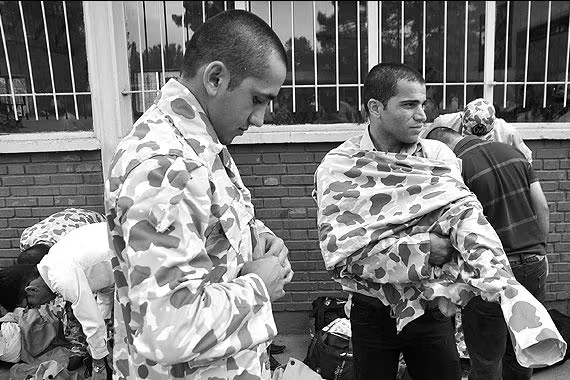
Iran says all the expats who haven’t served their compulsory conscription can pay €15,000 ($17,000) to buy their freedom from military service.

Iran says all the expats who haven’t served their compulsory conscription can pay €15,000 ($17,000) to buy their freedom from military service.
A member of the budget committee in the Iranian parliament, Mohammad-Reza Mirtajodini, said the plan only includes the absentees who are living abroad and at least five years have passed from their conscription due date.
He said the purpose of this law is that these people do not face any problem in traveling back to the country.
The new price for the service is in line with President Ebrahim Raisi’s efforts to encourage expats to return and invest in Iran’s cash-strapped economy that is struggling under heavy inflation and international sanctions.
According to Iran’s constitution, all men over 18 years old must serve in the military for about two years otherwise they cannot apply for a passport to leave the country. Most of them are drafted into the traditional Army, but some with the right connections serve with the Revolutionary Guard where conditions are much better.
In some especial cases, including being accepted by foreign universities, they can pay a hefty deposit and postpone their service, but the money is not refundable if they stay out of the country beyond the timespan of their education.
The offer is unlikely to have resonance among expat Iranian, who mostly left the country because of economic and social pressures.

Iran's first lady says her husband's much advertised praying at the Kremlin during his meeting with the Russian president "revealed the meaning of spirituality".
"The President's conduct at Kremlin Palace revealed the meaning of spirituality. His prayer highlights his government's spiritual dialogue," Jamileh Alamolhoda told female seminary students at Al-Zahra University of the religious city of Qom. She added that the Iranian media should "properly elucidate such moves".
Iranian media Wednesday published a photo showing President Ebrahim Raisi standing to prayer on his own in the Kremlin where he was meeting with the Russian President Vladimir Putin, apparently during their three-hour meeting.
The photo has been used extensively in what appears to be a publicity campaign for Raisi amid public criticism of his government's efforts to expand relations with Russia and China. Among Iranians the names of both countries are associated with communism and atheism.
Critics who have been saying that the Islamic Republic is ready “to sell Iran” to Russia and China just to ensure its survival, attacked Raisi’s prayer as a political show, while he went to Moscow “to beg for help.”
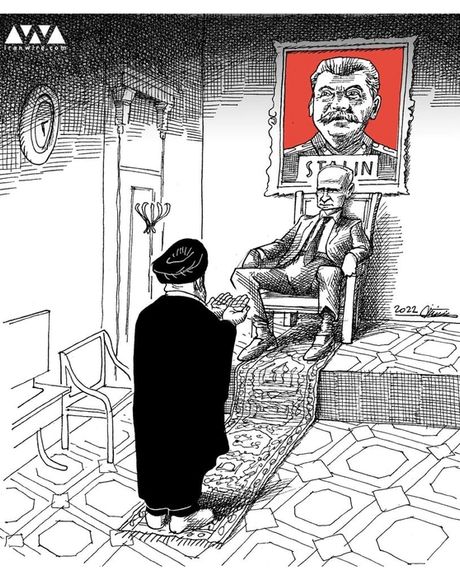
Raisi on Thursday also met with head of the Council of Russian Muftis, Ravil Einoddin, officially representing Russia’s Muslims in Moscow. According to Iranian media, Einoddin referred to the picture showing Raisi praying at the Kremlin and hailed his prayer as "super symbolic and outstanding".
According to the website of Iran's President, Einoddin told Raisi that someone from Finland sent him a message about the picture showing Raisi's prayer. "The Iranian president’s prayer 'brought blessings to the Kremlin'," the presidential website quoted Einoddin as saying.
The quotes from Einoddin have been widely circulated by Raisi supporters on social media, who called his act "a very important political and diplomatic message". They have also mentioned the "first prayer" at the Kremlin by the former Revolutionary Guards (IRGC) Qods Force commander Ghasem Soleimani during one of his visits to Moscow, which they say paved the way for Raisi's feat.
Quoting several social media post exalting Raisi's display of faith at the Kremlin, Iran's state-run television IRIB in a report Thursday said Raisi's religious gesture in the middle of his meeting with the Russian president has sparked "tens of political analyses".
Yet others have mentioned a letter in 1989 that Ayatollah Ruhollah Khomeini, the founder of the Islamic Republic, sent to then-Soviet-leader Mikhail Gorbachev. In the letter he advised the Russian leader to study Islam and predicted the end of communism.
"None of the former Soviet leaders could imagine the representative of the most important religious ideology [in the world] would one day stand to prayer in the Kremlin Palace and to flaunt "political Islam" to the world," Mehdi Andarziyan, an "America and Zionism researcher" according to his profile, tweeted.
Publisher Farhad Fallah shared a photo of Raisi's prayer and an image in a Spanish language book that depicts Soleimani's prayer at the Kremlin. "Soleimani's prayer at the Kremlin is now a model for children in Latin America. These scenes may be ordinary to us but for others they are educational," he wrote.
Another Raisi supporter said on Twitter that the publication of the photo by Iranian authorities bore the message that "the thinking once formed on the basis of atheism" has been defeated. "God willing, after the annihilation of liberalism, some day soon, we will hold Friday prayers at the White House," he promised.
In a Telegram post Thursday, conservative journalist Mohammad Mohajeri said finding fault with performing religious duties is wrong, but the publication of the photo was "a sign of inexperience and maladroitness of the government media team and "very novice-like".
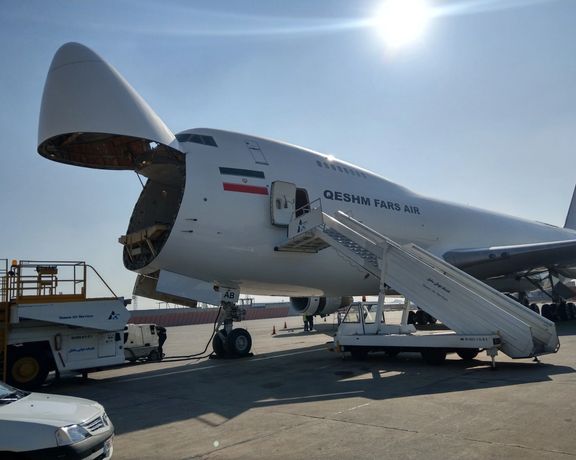
Flights by a sanctioned Iranian airline affiliated to the Revolutionary Guard to Myanmar have raised speculation of secretive military-to-military cooperation.
In an article published by Asia Times on Thursday, diplomatic sources based in Southeast Asia said the recent landings by planes owned by the Iranian cargo airline Qeshm Fars Air may have taken place to deliver weapons including guided missiles.
The sources said an Iranian delegation that landed in Myanmar on January 13 was either the second or third to visit since the military seized power in a coup on February 1, 2021.
According to data by flight tracker Flightradar24, a plane flew from Mashhad, Iran’s second-biggest city, to Myanmar last week and returned to Iran the following day.
Zin Mar Aung, the foreign minister of the shadow National Unity Government, said, “This is the second time I have noticed an Iran flight. It is understood [to be] communication related to military technology”, adding that “military relations between [Myanmar’s] military junta… and a country like Iran can be said to be a worrying situation, not only for atrocities against the Myanmar people but also from a regional and international security perspective”.
The US Treasury in 2019 imposed sanctions on Qeshm Fars Air that is linked to designated Iranian airline Mahan Air and Iran’s Islamic Revolutionary Guard Corps-Qods Force for allegedly transporting weapons to Tehran-backed groups Fatemiyoun Division and Zaynabiyoun Brigade in Syria.
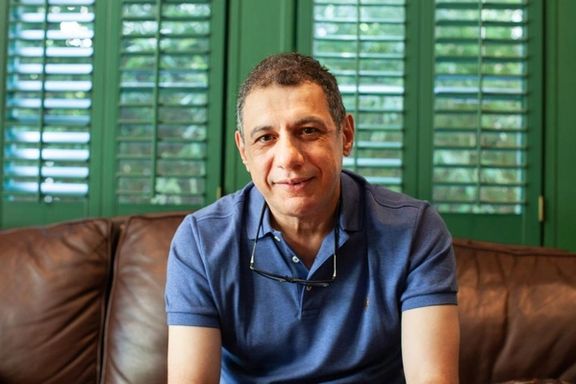
Nizar Zakka, a Lebanese a former hostage in Iran, has joined other rights activists protesting at the venue of nuclear talks between Tehran and world powers in Vienna.
Zakka said on Friday that he joined a sit-in that Barry Rosen, a former US diplomat held hostage in Iran for 444 days four decades ago, started earlier this week to demand the release of all foreign hostages in Iran before the United States and other world powers reach any agreement with Iran.
Zakka himself has established an NGO to support and help the release of people held hostage for unjust reasons. Zakka was detained in Iran on vague espionage charges, in what human rights organizations have described as essentially hostage-taking by the Islamic Republic.
UK-based Iranian journalist and activist Jamshid Barzegar has also joined Rosen’s sit-in that is gaining momentum. US Special Envoy for Iran Robert Malley met with Rosen on January 19 and urged him to end his hunger strike.
On Wednesday, a French tourist, Benjamin Briere, also detained in Iran on vague charges appeared in court where the judge made Iran’s intentions clear by using the word prisoner "swap", according to his lawyer.
Iran has detained many foreigners and dual nationals who have visited the country and used them as bargaining chips against Western countries, according to human rights organizations.
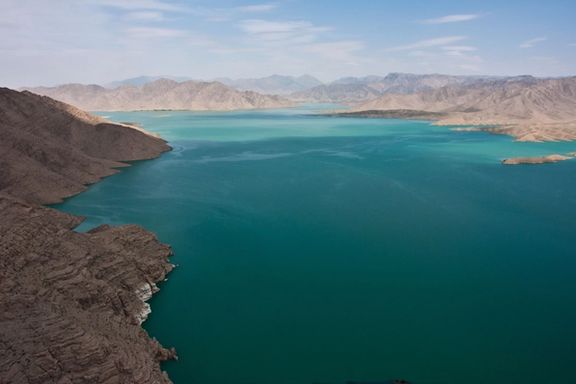
A Taliban minister has dismissed as rumor Iranian reports that Afghanistan’s new rulers have allowed water from the Kamal Khan Dam to flow into to Iran.
Iran's state-run television (IRIB) Wednesday reported that the water, released Tuesday, was heading to Iran and would soon reach Hamun Lake, Sistan-Baluchestan province, following diplomatic contacts with the Taliban designed to revive the Afghan-Iranian 1973 treaty over sharing waters of Helmand River (also known as the Hermand).
The previous Afghan government stopped the flow of water to Iran after inaugurating the Kamal Khan Dam, in Nimroz province, in March. In a speech unveiling the dam March 24 President Ashraf Ghani, while expressing commitment to the 1973 agreement, apparently suggested Kabul wanted to trade water for oil.
According to Afghanistan's Herat News, the Taliban minister of water and electricity Abdul Latif Mansur said Wednesday that water from the dam had now been released only for the use of Afghan farmers and that any other claims were “rumors.”
Another reason why the Taliban opened water from the dam could be heavy snow and rain in the region for the past ten days. Some local dams in Iran became full and authorities had to release excess water.
But Iran’s Javan newspaper ran a report Thursday in which Hasan Kazemi-Ghomi, Tehran’s representative for Afghan affairs, expressed appreciation for the Taliban releasing Iran’s “share of water."
Javan, which is affiliated to the Revolutionary Guards (IRGC), wrote that in contrast to the previous Afghan authorities, the Taliban “abides with the official agreements with Iran and does not oppose Iran's share of the waters of Hirmand." Looking forward to the water reaching the parched Hirmand River and Hamun Lake, Javan suggested this resulted from discussions during the visit of Afghan Foreign minister Amir Khan Muttaqi earlier this month and a “five-month friendship-diplomacy."
The Taliban government is yet to be fully recognized by any country, and some Iranian media have suggested the Taliban may be looking to trade water for full diplomatic relations.
In a commentary headlined "Water in Return for Recognition," the reformist Etemad newspaper said Thursday that the Taliban's intentions were unclear. Opening the dam’s gates during the rainy season might be a bargaining gambit, it suggested, rather than acceptance of the 1973 Afghan-Iran treaty, under which Afghanistan agreed to release annually around 850 million cubic meters of water (26 m3 per second) to Iran.
Tehran has for decades complained about not always receiving this share. In 1999, for instance, the Taliban turned off the flow completely. In August a Taliban spokesman dismissed as "enemy propaganda" reports and a video circulating on social media showing waters flowing from the Kamal Khan Dam towards Iran, insisting the water was not for Iran.
A recent report by the Iranian Parliament’s Research Center said around one-fifth of 282 Iranian cities are facing water shortages. Sistan-Baluchestan, one of the provinces hit worst by drought, has seen hundreds of villages abandoned in the past two decades.
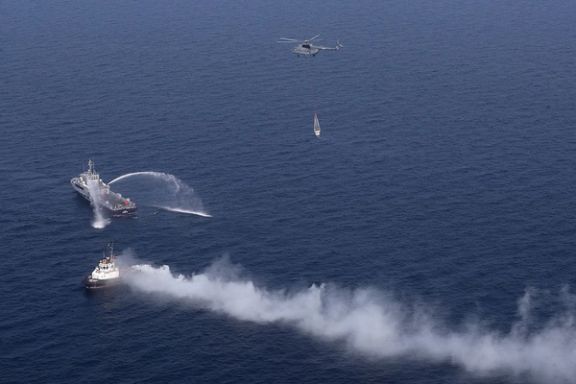
Iran, China and Russia held their third joint naval drills in the northern Indian Ocean on Friday, amid Tehran’s push to expand ties with the two Asian powers.
Navies from Iran's armed forces and Revolutionary Guards are taking part in the "2022 Marine Security Belt" exercise over an area of 17,000 square kilometers (6,560 square miles), Rear Admiral Mostafa Tajoldini, spokesman for the drills, told state TV.
The drills, which began in the early hours of Friday, will include various tactical exercises such as rescuing a burning vessel, releasing a hijacked vessel, and shooting at air targets at night.
The three countries started joint naval drills in 2019 in the Indian Ocean and the Sea of Oman area, Tajoldini said.
"The purpose of this drill is to strengthen security and its foundations in the region, and to expand multilateral cooperation between the three countries to jointly support world peace, maritime security and create a maritime community with a common future," Tajoldini said.
Since coming to office last June, Iran's hardline President Ebrahim Raisi has pursued a "look east" policy to deepen ties with China and Russia. Tehran joined the Shanghai Cooperation Organization in September, a central Asian security body led by Beijing and Moscow.
Foreign Minister Hossein Amirabdollahian visited China last week and Iran's president met his Russian counterpart in Moscow on Wednesday.
Reporting with Reuters